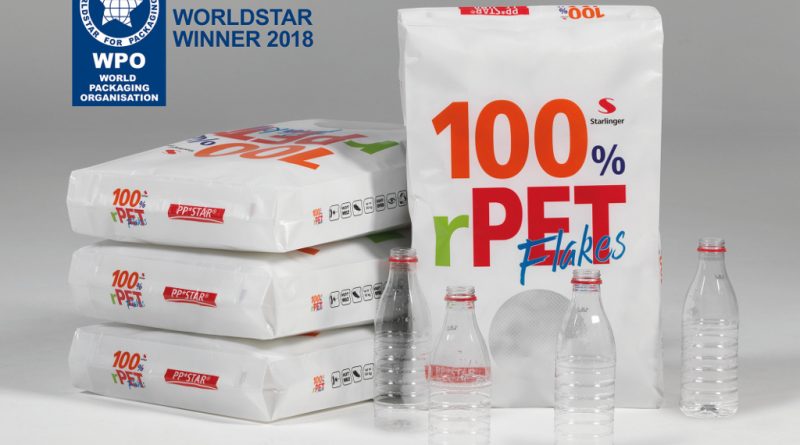Starlinger’s rPET PP*STAR: a real world star
For many years, the PP*STAR, a pinch bottom bag produced on Starlinger machinery, has been known as a robust and attractive packaging solution for products such as dry pet food, fertiliser, sugar, flour, or rice. Since early 2017, the PP*STAR can be manufactured directly from PET bottle flakes, turning it into the rPET PP*STAR. This sustainable concept has recently been awarded two prizes.
It turns out that the rPET PP*STAR, which has been designed for dry bulk goods, is a real world star. At national level, it was first awarded the national Green Packaging Star Award in September 2017. At the international level, the rPET PP*STAR is among the winners of the prestigious international WorldStar Award in the category “Packaging Materials and Components” and on the shortlist for the Sustainability Award. The WorldStar award ceremony will take place on May 2, 2018 in Gold Coast, Queensland, Australia.
Bag manufacturing in a fully closed loop: This is the concept that impressed the jury. While other types of packaging are made from recyclable virgin material, the rPET PP*STAR already consists of 100 % recycled material. To be more precise, the bag is made from rPET bottle flakes, without the use of virgin material. Used bottles are turned into bags that are in turn recyclable: a maximum of waste reduction.
The recycling in a closed loop is favored by the use of the plastic PET. Through a process known as polycondensation, the original properties of the material can be restored, meaning that a bag can theoretically be recycled indefinitely. The quality of the material remains the same, and with it the proven break resistance and the bag’s suitability for use in food contact.
Well in advance of receiving any prizes, the PP*STAR was known as distinctly environmentally friendly, given that it is a real lightweight. While a 3-layer paper bag for 50 kg fertilizer weighs about 140-160 g, the weight of a one-layer rPET PP*STAR is a mere 117 g. And that does not only save material, but also transport cost and carbon dioxide because a great number of unfilled bags can be transported on one pallet.

